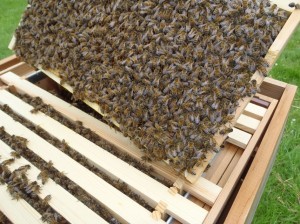Some of you may have noticed changes taking place this year in the Walled Garden, which have been undertaken to house some special new residents! The campus is now home to three honeybee colonies, with around 50,000 bees per hive, housed within a special apiary (or bee yard) at the back of the Harris Garden.
The Harris Bee Garden Project began last year through a generous donation from the Annual Fund allowing us to create our apiary with the addition of a new bee shed. The beekeeping team, consisting of Helen Dominick, Julia Janes, Mark Fellowes and Becky Thomas, took part in beekeeper training over winter with the Reading and District Beekeepers Association getting us ready for our new arrivals.
The aims of the project were to develop a new teaching and outreach resource for the School of Biological Sciences. Honey bees are a fascinating educational resource, existing in huge colonies containing thousands of female workers, contributing a vital service to the UK economy by pollinating many of our crops. They’re the only insect which produces food eaten by people, up to 27kg per hive in a good year and they fly 1½ times round the world to make just 1lb of honey! They have also suffered in recent years, from wide usage of insecticides like neonicotinoids in our countryside, to the deadly Deformed Wing Virus transmitted by the varroa mite and general loss of foraging habitat; bees are having a hard time.
Our new bees are settling into their homes nicely, and although it hasn’t all gone smoothly, we have started the process of extracting honey from our hives and we were so excited to taste our first honey crop. If we are able to get our colonies through the winter, then we’ll start using the bees for teaching and outreach activities in the spring and we are also planning an Open Day event so people can come and see what we have been up to.



